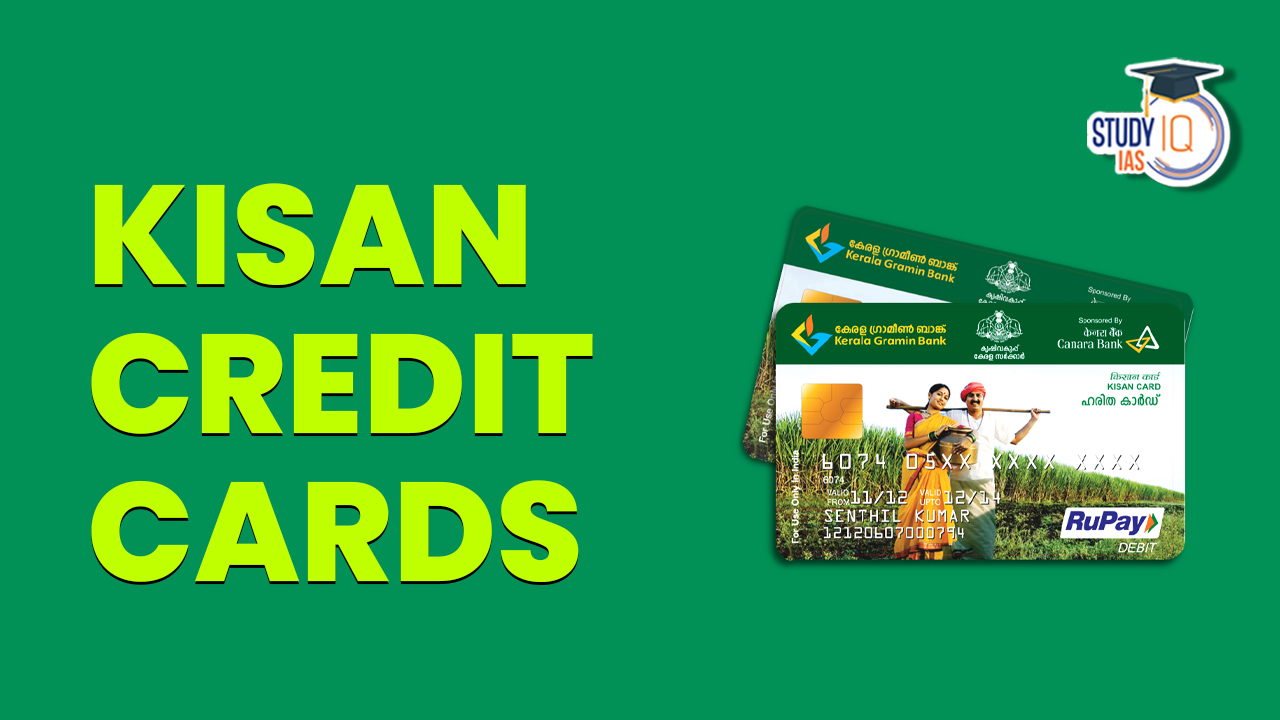Table of Contents
Kisan Credit Cards
In the middle of India, where farming is really important for the economy and people’s lives, something important has been happening quietly. It’s called the Kisan Credit Card, and it’s like a special card that helps farmers with money. Even though cities are using fancy technology, villages are changing too. This card is like a superhero for farmers, helping them with money and making their lives better. Among the farms and crops, the Kisan Credit Card is like a light that shows farmers a better future and helps them take care of themselves.
Kisan Credit Card Scheme
The Kisan Credit Card (KCC) scheme is a pioneering agricultural financing initiative introduced by the Government of India to provide timely and adequate credit support to farmers. Launched in 1998, the scheme aims to meet the short-term credit requirements of farmers for crop production, post-harvest expenses, maintenance of farm assets, and other allied activities.
KCCs are essentially credit cards issued by banks and other financial institutions to eligible farmers, enabling them to access hassle-free and affordable credit for their agricultural needs. This scheme plays a crucial role in enhancing agricultural productivity, promoting modern farming practices, and ultimately improving the livelihoods of farmers across the country.
Read about: Ek Bharat Shreshtha Bharat
Eligibility for KCC
The eligibility criteria for obtaining a Kisan Credit Card (KCC) are specified by the Reserve Bank of India (RBI) through Master Circulars. According to these directives, a diverse range of individuals are eligible to apply for a Kisan Credit Card:
- Individual Owner Cultivators: Farmers who own and cultivate their land are eligible for KCC.
- Tenant Farmers: Farmers who are tenants and cultivate the land are also eligible.
- Sharecroppers and Oral Lessees: Those who cultivate the land on a sharecropping or oral lease basis can apply.
- Joint Liability Groups (JLGs) and Self-Help Groups (SHGs): These groups comprising individual owner cultivators, tenant farmers, sharecroppers, and oral lessees are eligible for KCC.
- Fishermen with Registered Boats: Individuals owning registered boats or fishing vessels along with a valid license or permission for fishing in estuaries or the sea are eligible.
- Inland Fisheries and Aquaculture Participants: JLGs, SHGs, fish farmers, and women groups involved in inland fisheries and aquaculture are eligible.
- Small Animal Farming: JLGs, SHGs, and tenant farmers engaged in farming rabbits, goats, sheep, birds, and poultry with owned, leased, or rented sheds are eligible.
- Dairy Farming: JLGs, SHGs, and tenant farmers involved in dairy farming with owned, leased, or rented sheds are eligible.
In addition to the categories mentioned above, partner banks may impose additional eligibility criteria. Some of these criteria are:
- Production Credit: Applicants should be able to raise a minimum production credit, often set at ₹5,000.
- Age Limit: Eligible applicants must fall within the age range of 18 to 75 years.
- Co-Borrower for Senior Citizens: If the applicant is above 60 years of age, having a co-borrower who is a legal heir or immediate kin becomes mandatory.
Read about: Digital India Mission
Benefits of Kisan Credit Card
The Kisan Credit Card (KCC) scheme offers a range of benefits to farmers and individuals engaged in agricultural and allied activities. These benefits are designed to provide financial support, flexibility, and convenience to farmers, empowering them to enhance their agricultural productivity and overall livelihood. Some of the key benefits of the Kisan Credit Card are:
- Easy Access to Credit: KCC provides farmers with timely and adequate credit for agricultural and allied activities. This ensures that farmers have access to the necessary funds when they need them the most, such as during sowing, cultivation, harvesting, and marketing of crops.
- Flexible Credit Limit: The credit limit under the KCC is flexible and determined based on the cropping pattern, scale of operation, and credit requirements of the farmer. This allows farmers to borrow according to their specific needs.
- Multiple Withdrawals: Farmers can make multiple withdrawals from the KCC account, up to the sanctioned credit limit. This provides them with the flexibility to use funds as per their evolving requirements throughout the crop cycle.
- Interest Subsidy: The government often provides interest subsidy to eligible farmers, which reduces the cost of borrowing. This makes credit more affordable and encourages farmers to invest in modern agricultural practices and technologies.
- Convenient Repayment: The KCC scheme offers flexible repayment options. Farmers can repay the borrowed amount at their convenience, generally after the harvest and sale of crops.
- Insurance Coverage: Many KCC schemes offer insurance coverage for crops, livestock, and other assets. This provides a safety net for farmers in case of unforeseen events such as crop failure, natural disasters, or health issues.
- Digitization and Technology Integration: The KCC scheme is being integrated with digital platforms, enabling farmers to access their credit and manage their accounts online. This promotes financial inclusion and empowers farmers with technology.
- Working Capital for Allied Activities: Apart from crop cultivation, KCC funds can be used for activities such as animal husbandry, poultry farming, dairy farming, fisheries, and other allied activities.
- Reduced Dependence on Informal Sources: By providing formal credit to farmers, KCC reduces their dependence on informal moneylenders who often charge exorbitant interest rates.
- Boost to Rural Economy: Access to credit through KCC stimulates rural economic activities and promotes agricultural growth. It helps in modernizing farming practices, improving productivity, and increasing farmers’ income.
Read about: Meri Mati Mera Desh Campaign
Interest Rates on KCC
The Kisan Credit Card (KCC) interest rates are linked to the Marginal Cost of Funds Based Lending Rate (MCLR) and may also involve government-provided interest subvention to offer subsidized rates. For short-term KCC loans up to ₹3 Lakhs, a 7% interest rate applies, along with a 1.5% interest subvention to lending institutions. Additionally, farmers who repay the loan within a year can receive an extra 3% subsidy on the KCC interest rate.
The Kisan Credit Card interest rates vary among different banks based on the loan amount and issuing bank. Here’s a glimpse of the KCC interest rates offered by some top banks:
- State Bank of India (SBI): 7% per annum for loans below ₹3 Lakhs.
- Punjab National Bank (PNB): Minimum KCC loan interest rate of 7% per annum.
- HDFC Bank: Minimum KCC interest rate of 9% per annum.
- Axis Bank: Interest subvention-based, up to 8.85% per annum.
- Indian Overseas Bank (IOB): 7% per annum for loans up to ₹3 Lakhs with a 1-year tenure.
The government provides a 3% per annum interest rate subsidy for prompt repayments. For loans above ₹3 Lakhs, the interest rate is variable and currently set at the one-year MCLR plus 2.50%.
It’s important to note that the Kisan Credit Card interest rates are influenced by the loan amount, the issuing bank’s policies, and any government-driven interest subvention schemes. Different banks may offer different rates to cater to the diverse needs of farmers across the country.
Read about: Atmanirbhar Bharat Abhiyaan
Kisan Credit Card Loan Limit
The Kisan Credit Card (KCC) loan limit varies based on factors such as the type of crop, operational costs, post-harvest expenses, working capital requirements, and the repayment capacity of the farmer. The credit limit is determined to ensure that farmers have access to adequate funds to meet their agricultural needs.
The KCC loan limit can range from a few thousand rupees to several lakhs, depending on the specific circumstances of the farmer and the agricultural activities they engage in. It’s important to note that different banks and financial institutions may have varying criteria for determining the KCC loan limit.
In general, the KCC loan limit is designed to provide farmers with flexible and convenient access to credit that aligns with their agricultural production cycles, helping them manage their expenses efficiently and enhance their agricultural productivity.
Read about: Azadi ka Amrit Mahotsav
Kisan Credit Card UPSC
The Kisan Credit Card (KCC) holds significant importance for the UPSC examination as it aligns with various aspects of the UPSC Syllabus, particularly in areas related to agriculture, rural development, and financial inclusion. A thorough understanding of the KCC scheme is crucial for aspirants aiming to excel in topics such as government schemes, agricultural finance, and rural credit mechanisms. UPSC Online Coaching and UPSC Mock Test often emphasize the KCC as it showcases the government’s efforts to support farmers, promote sustainable agriculture, and ensure rural economic growth. Aspirants can expect questions on the KCC’s features, benefits, eligibility, interest rates, and its role in rural development, making it an essential topic to cover comprehensively for UPSC preparation.


 Accredited Social Health Activists (ASHA...
Accredited Social Health Activists (ASHA...
 World’s 1st Unique Q-Shield Platform a...
World’s 1st Unique Q-Shield Platform a...
 New Phase of Operation Chakra to Combat ...
New Phase of Operation Chakra to Combat ...





















